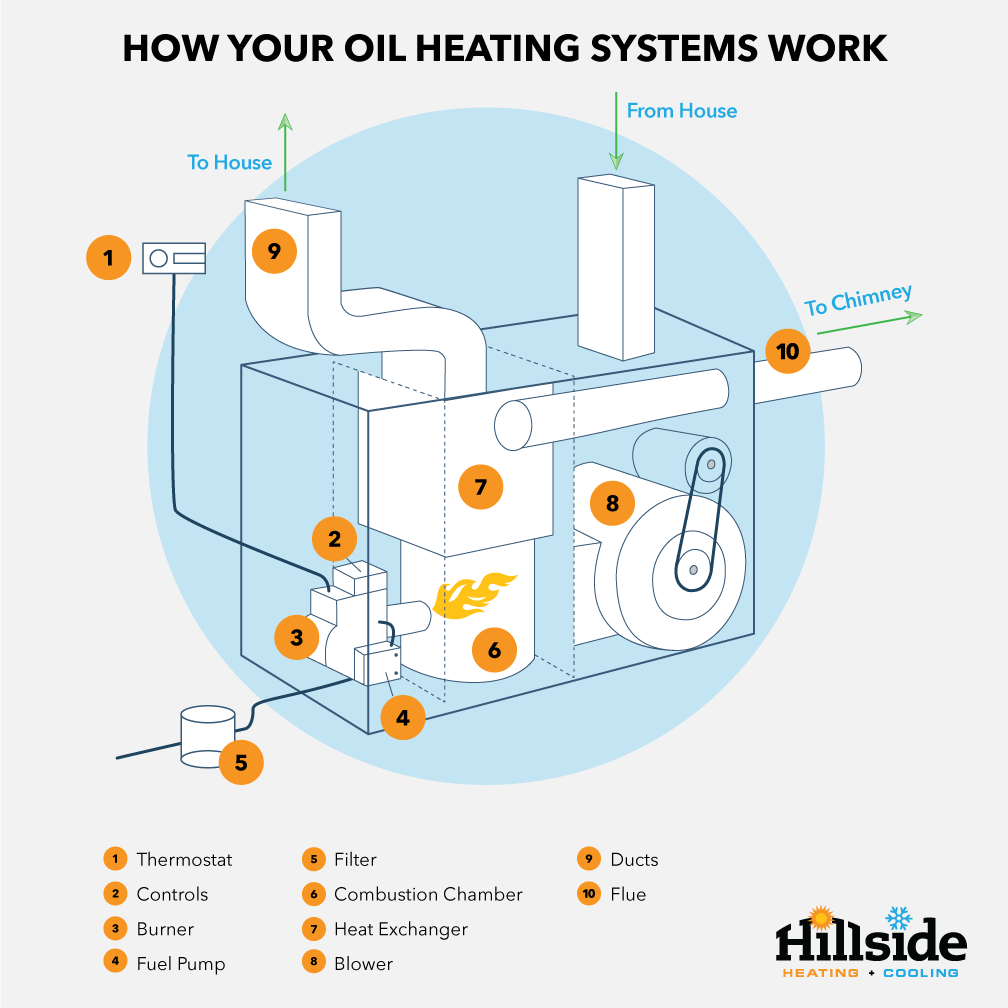Boiler Installation, Repair, and Maintenance In DE, PA, & MD
Services For Your Radiant Heating System
For over 70 years, Hillside has been the trusted expert for boiler installation, repair, and maintenance services in Delaware, Pennsylvania, and Maryland. If you’re considering a new boiler installation this season, look no further. Whether you’re replacing an old boiler or need a new one for a construction project, we offer free estimates on all boiler replacements and installations.
Switching to a high-efficiency boiler system can lead to significant savings on your annual fuel costs, allowing you to enjoy both energy efficiency and enhanced comfort in your home or business.
Our skilled technicians are fully trained and certified to install, maintain, and repair these heating systems. With decades of experience, you can rely on Hillside for all your boiler needs, including installation, routine maintenance, and emergency repairs.
For a FREE QUOTE, call us at 302-738-4144 (DE&PA) or 410-398-2146 (MD). We’ll give you an HONEST ESTIMATE for any boiler installation, repair, or maintenance service.
Request Boiler Services
This contact form does not substitute for a service call request. Please call our office 302-738-4144 or 410-398-2146. Thank You.
BOILERS
What is a boiler?
A boiler is a reliable heating system that keeps your home (and paws) warm and cozy throughout the colder months.
A residential boiler operates differently than a furnace. Instead of blowing hot air, it heats water and circulates it through pipes and radiators to warm your home, delivering that cozy radiant heat we all love.
A boiler offers several advantages, making it an excellent choice for heating and cooling your home:
- Consistent Heating: Boilers provide consistent and even heat distribution, ensuring that every room in your home reaches a comfortable temperature without cold spots.
- Energy Efficiency: Modern boilers are designed for high efficiency, often converting a significant portion of their energy input into usable heat, leading to lower energy bills compared to less efficient heating systems.
- Longevity: Boilers tend to have a longer lifespan than other heating systems, often lasting 15 years or more with proper maintenance, making them a wise investment for homeowners.
- Space Savings: Boiler systems often require less space than forced-air heating systems, as they can be compact and easily installed in smaller areas.
- Quiet Operation: Unlike furnaces, which can be noisy, boilers operate quietly, providing a peaceful indoor environment.
- Improved Air Quality: Boilers do not rely on air ducts, which can accumulate dust and allergens, helping to maintain better indoor air quality and making them suitable for allergy sufferers.
- Versatility: Boilers can be used for various applications, including heating water for domestic use, providing heat for swimming pools, and serving as a heat source for radiant floor heating systems.
- Safety Features: Modern boilers come equipped with advanced safety features, such as automatic shut-offs and pressure relief valves, ensuring safe operation.
- Eco-Friendly Options: Many boilers can be powered by renewable energy sources, such as biofuels or electric heat, reducing their environmental impact.
- Less Maintenance: While regular maintenance is essential, boilers typically require less frequent servicing compared to some other heating systems, leading to lower long-term maintenance costs.
Overall, boilers offer efficient, reliable, and comfortable heating solutions for homeowners, making them a popular choice for residential heating needs.
For an honest and FREE estimate on a boiler repair, service, or installation, call us at 302-738-4144 (DE & PA) or 410-398-2146 (MD).
How Do Boiler Work?
- Thermostat: The thermostat sends a signal to the controls, initiating the heating process.
- Controls: The controls activate the burner, which is responsible for the combustion process.
- Burner: The burner atomizes the oil into a fine spray, mixes it with air, and ignites the mixture in the combustion chamber, producing intense heat.
- Fuel Pump: The fuel pump draws oil through a filter to ensure that clean fuel is supplied to the burner.
- Filter: The filter ensures that only clean fuel reaches the burner, preventing contaminants from entering the system.
- Combustion Chamber: The heated oil ignites in the combustion chamber, generating significant heat, which warms the water.
- Heat Exchanger: The heat exchanger transfers heat from the combustion gases to the water without mixing them, efficiently warming the water.
- Blower: The blower helps circulate the heated air throughout the home.
- Ducts: The ducts carry the warm air to different rooms, ensuring even distribution of heat throughout the space.
- Flue: Combustion emissions are vented out through the flue, ensuring that harmful gases are safely expelled from the home.

Boiler vs Heat Pump
The main differences between a boiler and a furnace lie in their operation, energy source, efficiency, and applications. Here’s a breakdown:
Operation:
- Boiler: A boiler heats water or generates steam to provide heating for a home. The heated water circulates through pipes to radiators or baseboard heaters, distributing warmth throughout the living space.
- Furnace: A furnace generates heat by burning fuel (natural gas, oil, or propane) or using electricity to heat air. This warm air is then distributed throughout the home via ductwork.
Energy Source:
- Boiler: Typically powered by natural gas, oil, propane, or electricity, boilers utilize fuel to produce heat that warms the water for circulation.
- Furnace: Generally uses fossil fuels (such as natural gas or oil) or electricity to create heat directly.
Efficiency:
- Boiler: Modern boilers are designed for high efficiency, providing consistent and even heating. They often have longer lifespans compared to furnaces.
- Furnace: While furnaces can be efficient, they may have higher energy consumption due to the need to heat air directly.
In summary, boilers heat water and distribute warmth through pipes, while furnaces generate heat by burning fuel or using electricity to warm air. The choice between the two often depends on individual heating preferences, system compatibility, and energy availability.
Heat Pump vs Central Air
The main differences between a heat pump and central air conditioning lie in their operation, heating capabilities, and applications. Here’s a breakdown:
Operation:
- Heat Pump: A heat pump functions as both a heating and cooling system. It transfers heat between the indoors and outdoors, extracting heat from the outside air to warm your home in winter and expelling indoor heat to cool your home in summer.
- Central Air Conditioning: Central air conditioning systems are designed solely for cooling. They absorb heat from inside the home and expel it outside, lowering indoor temperatures.
Heating Capabilities:
- Heat Pump: Often has a higher efficiency rating than a furnace, especially in moderate climates, as it can deliver more energy in heating or cooling than it consumes in electricity (measured as a coefficient of performance, or COP).
- Furnace: Efficiency is measured as an Annual Fuel Utilization Efficiency (AFUE) rating, which indicates how much fuel is converted into usable heat. While modern furnaces can be quite efficient, they still generally consume more energy than heat pumps to produce the same amount of heat.
Heat pumps are highly adaptable systems that offer both heating and cooling capabilities, making them ideal for year-round climate control. In contrast, central air conditioning systems are designed exclusively for cooling, meaning homeowners must rely on alternative heating solutions, such as gas or oil furnaces, electric heaters, or heat pumps, to ensure comfort during the colder months. This separation of functions highlights the practicality of heat pumps as a comprehensive solution for managing indoor temperatures year-round.
- Modern Energy-Efficient Products
- Exceptional Customer Service
- Fast and Flexible Scheduling
- Up-Front and Fair Pricing
- Industry Leading Warranties
- Excellent Service and Maintenance Plans
- Courteous and Professional Technicians
- Over 70 Years of Industry Expertise
THE TRUSTED COMFORT EXPERTS OF DE, MD, & PA

Proudly Serving New Castle County, DE, Cecil County, MD and Southern Chester County, PA.

302-738-4144 (DE & PA) 410-398-2146 (MD)
WE LOVE OUR CUSTOMERS
All of our work is guided by three generations of family attitudes and values – respect, loyalty, integrity, accountability, honesty, kindness. We pride ourselves on building excellent relationships with our customers, some of whom we have served for decades, and then gone on to serve their children for decades. Above all, we know what it’s like to be a customer and how we’d like to be treated.
That’s why we’re so honored to have received thousands of glowing ratings, reviews, recommendations, and testimonials from our heating and cooling customers. It means the care we put into our work shows through, and that we truly are doing customer service right.